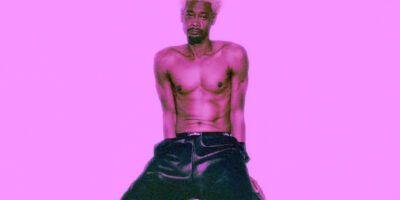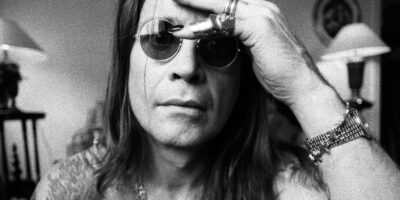2020 had to be someone’s year. After over a decade of quietly churning out solid post-punk, indie rock, ambient, and drone music from an ever-evolving DIY scene, Fire Talk has seemingly reached another level, putting out some of this year’s most exciting, memorable, and acclaimed albums. With a year chock-full of releases by artists including Deeper, Dark Tea, Pure X, Dehd, and corey flood, Fire Talk founder Trevor Peterson has finally been able to make the label his full time focus. I caught up with Peterson amidst an office move to talk about his label’s homegrown beginnings, the heyday of the Brooklyn DIY scene, and putting out vinyl with leftover money from a student loan.
What led you to the idea of starting Fire Talk, and is Fire Talk the first record label you’ve been involved with?
Trevor Peterson: Fire Talk is the first label I’ve been involved with in terms of the business side of putting out records. This is the 11th year of Fire Talk. It started as a vessel to release my own music. I had a band called Woodsman. We were active from 2008 to 2016-ish. The band was sort of forming and gestiating and it was in the really early blog days when you could throw some tracks on MySpace and book a tour around that pretty easily. We had booked our first tour and created a CDR. In an effort to make our merch look a little more legit, we crafted this Fire Talk logo. The seed of the idea was “Let’s self-release this thing so that our merch looks a little more legit with a label logo on it.” That was the start of it. Shortly thereafter a couple of friends asked if they could use the logo, and the third time someone asked me I was just, like, why don’t I just pay for these releases and make it into a real thing. That’s my roots. I come from the artist side.
Going into this was any part of you, like, “I want this to be a thing that goes on for 10-plus years”? Was that on the back of your mind going into this?
TP: I don’t think it was on the front of my mind, nor was it a consideration. I was in my early 20s. I don’t know many folks who are thinking that far ahead. I’ve always been interested in business. What was in the back of my mind was “I’m going to work in music no matter what.” I think back then when you’re first starting a band and you’re getting national attention, you think the band is going to be the thing you do for the rest of your life. I’m lucky that I did have that thought, and it just maybe stems from being entrepreneurial in spirit. I’ve always tried to do my own thing in terms of work, so it worked out. It was purely just a community building exercise.
It seems like that worked out super well then!
TP: Yeah. Through years and years of building and all the things that come with starting a business. Failures and ups and downs, it’s all good.
What would you say the moment that you look back on as the greatest up is? Conversely, what would you say your biggest failure was? How did both of those impact how you run a label?
TP: That’s a good question. I would say the biggest up is every day it gets better and better. It just comes through knowledge and doing it over and over. When you get this deep into it, it’s about creating systems that work. I have an employee. The milestones are palpable now. I never really look at anything as a failure because they’re all learning experiences. There’s always disappointment when you’re wearing your A&R hat and you’re, like, “This is the best thing I’ve ever heard” and no one connects with it, that can feel like a failure. But just understanding that there’s many factors in releasing records and why they connect with a greater amount of people. I don’t think I’ve looked at any of the releases in the catalog as failures. They all have their special place in the history of Fire Talk.
What I can speak to though is the moment that I decided this is going to be the job. In 2017 a lot of life stuff happened. The band kind of stopped, my partner became pregnant. My first kid was on the way. All of these serious life moments, I was, like, I gotta get serious about this label thing. Figuring out what that meant, that was the time. Now we’re starting to see all of that work. That’s what it takes when you’re starting anything, especially in music. Music is so based on subjective taste at the end of the day. That’s the big moment for Fire Talk. A lot of life stuff happening and realizing I really wanted to work in music, so I should get serious.
That sounds like a pretty cathartic time in your life in general. Over a decade into running this, are there any specific releases you’ve put out that you look back on and are, like, “Holy shit! I’m so happy with how this came out”? What are some of your favorite moments throughout the years, as far as music you’ve put out goes?
TP: There are so many. Way back in the day, the first big success was Tennis. I put out their first seven-inch. They’re lifelong friends of mine and we stay in touch to this day. The label wasn’t set up to help them make a career of it. It was just a one-off seven-inch. There’s no way Fire Talk could have been involved in anything other than that. But being there at the moment and helping put that first thing out and get their first write-ups on websites, that was really fun. It was the first time it wasn’t my band I was helping get national attention, and I was, like, “Okay, I can do this!”
Along the way, Baby Birds Don’t Drink Milk is a very important band in the label catalog and the world. It goes as deep as, like, Emily from Dehd has Baby Birds Don’t Drink Milk’s first album cover as a tattoo. She’s a tattoo artist and she has a ton of tattoos. One of her first tattoos is that cover that she got on her leg, like, eight years ago before anyone from the Fire Talk circle even knew Emily. We were all just in the DIY scene back then. That’s a band that connects so many different parts of the label. Not many people know about that band, but musicians in a certain portion of the DIY basement show noise world know about that band. That’s an important one because it solidified bands finding each other through other bands they like. Earring, which is Jason from Dehd, we met because he was on tour with Drew from Baby Birds Don’t Drink Milk. Then Jason basically signed Deeper to the label. That was a big moment. Meeting Jason because of that set up the next five years of the label.
Then stepping back, ADVAETA (now called Weeping Icon) is a very important release in the catalog because Lani in that band was booking a venue in New York at the time called Silent Barn. She was helping with A&R. She was my very first person outside of myself who helped the label. The office was even in her basement. She signed Dreamcrusher. She started that umbrella of the label.
More recently… there are so many now that I can’t point to a specific release. But I guess Dehd, FLOWER OF DEVOTION, because it’s the current one and it’s getting more acclaim than anything we’ve ever put out and it’s really propelling the next phase of Fire Talk.
For me, that Dehd record sounds like Fire Talk. Having checked out a lot of the label’s releases and then coming back to FLOWER OF DEVOTION, I was kind of starting to hear it, but that record has all of the elements of a Fire Talk band. For me, it tows the line really interestingly between indie pop, rock n’ roll, and post-punk. That record, from an outsider’s perspective, was the culmination of that trend I’ve noticed in your label’s sound.
TP: Yeah. Don’t forget the ambient and noise. Those are also important parts of Fire Talk, and those are the releases that don’t get as much shine, but we try to release that kind of music too consistently. Dreamcrusher and Weeping Icon are pretty punk/post-punk bands, but at their core they have a lot of noisy elements. We have a new signing we’re announcing in a month from Manchester, UK that’s exciting for us. It skews pretty heavily into the noise rock realm. You could loop it into post-punk, but that’s totally right on because that’s sort of my taste and what’s developed over the years. Whenever I explain it to somebody, I try to think of Fire Talk as, like, when you walk into your favorite record store in the rock section there’s the experimental, the post-punk section, there’s the indie section… the little section that surrounds the rock and pop section, that’s where we want our records existing.
I can imagine exactly where that is at my local record store. That’s a good way to put it. So I was going through the back catalog yesterday and I noticed that you put out the EP MOON LANDING? by Turnip King, which was one of my favorite records back in high school. That was on repeat for me pretty much every day. I’m wondering how you connected with Turnip King.
TP: Turnip King was in high school at the time. They were at every show. I lived in Brooklyn, and in that era we had five strong DIY spaces that were essentially venues: Death By Audio, Monster Island Basement, Shea Stadium, Glasslands, and 285 Kent. Then there were also a bunch of warehouses. It was really the heyday of music in Brooklyn because there was a lot of access for younger kids to come to shows. They were at all the shows. They started playing shows. I think my band played a show with them or I saw them play and I was just, like, “I love this band. Let me put out your cassette.” But it was very innocent because they were still in high school. I went on to put out an LP from them as well. The connection was strictly from seeing them play and being excited about the music they were making and the fact that they were so young and their influences were right in line with the music I listened to. It was perfect.
I was roughly their age when that EP came out. I’m from D.C. originally, so I’m from a similar all-ages DIY scene. But when you’re from D.C. you look to New York as the standard for what a city’s doing and I just remember seeing that they were absolutely crushing it in the New York DIY basement scene and really trying to push my band to be equivalent to that. It was cool to go back through your roster and remember that they were on there.
TP: Yeah, yeah. One of my favorites. They’ve been working on another record for five years now. I don’t know if it’ll ever come out, but they’ve been dangling the carrot, sending emails, like, “It’s almost there.” So we’ll see.
Fingers crossed! I would definitely be excited to hear it!
TP: They’ve gone in so many different life directions at this point. If you can imagine being 16 and putting out music and now being in your mid-20s.
What would you say your average process for discovering or approaching a band is? Would you say more bands come to you, do you reach out to bands, or is it more of an organic hear-someone-play-and-you-like-it process? How do you find your average artist?
TP: It’s a lot more involved now than it was in the early days. Early days either I saw them play live and was enthralled, or it was someone I met in the circle of all-ages DIY or touring. I met a lot of bands on tour that would help us set up a show and I’d put out a seven-inch for because they were awesome. That was the early days. Very loose.
Now it’s a bit more reigned in. I have an A&R, Ruby is her name, she works for me. We do weekly A&R. We’re always sharing new music and looking at bands. That’s part of the process. Reading websites and trying to find stuff that maybe is, like, new or interesting. It’s so involved. That’s where it starts, but also there’s a lot of other factors that come into it nowadays. Discovery is multi-pronged.
It’s a lot different in the COVID time. I used to go to a lot of shows. That was the main way, pre-COVID, was researching scenes like London. Let’s say right before black midi took off, who’s opening for them at The Windmill in London? Figuring out who’s playing with each other and who’s influencing each other, that’s a good place to go. It’s gotta be similar to the same process as writing about bands, in a way. Now the label is taking a different shape and we have to start looking at the business side of things too when we’re singing bands. That comes into play also. That’s not the whole thing, but you want to make sure the bands are active and are doing something, whether it’s engaging on socials or self-releasing music. It’s multi-faceted. It’s not about me anymore, and I’m trying to make it more not about me. I don’t want to rely on myself and my tastes for the future of this record label. If it’s going to go in the direction it’s going in, I need Ruby, I need other viewpoints to make this thing as strong as it can be. That’s where I am now.
That makes sense! I feel like looking at other cities or looking at who’s going on tour with what band or who’s the local opener in a city, that’s how I find new music to write about. I’ve found a lot of my favorite artists I’ve written about through that. I feel like that’s a commonality between music journalism and putting out music.
TP: There’s a whole circle of label A&Rs too. People share music in the A&R world too. You just stay alert, look at what’s going on. I listen to music all day, I look at blogs all day, I look at streaming services all day, I look at social media. If I’m doing A&R, I’m looking at all of those things online, and also in the real world just seeing who’s playing with each other. All of it points you in a direction.
Are you originally from Brooklyn? How do you feel like being a label in New York City impacts what you put out? How have you seen the city’s music scene change over 10-plus years of running Fire Talk?
TP: I’m not originally from Brooklyn. I moved here from Denver, Colorado. That’s where the label started. That’s where Woodsman was from, and Tennis, and some of our other friends. I moved to New York in the end of 2010, right at the last phase of Brooklyn DIY.
There’s been so many changes. It follows the trajectory of New York City in general. When I first moved here it was an all-ages renaissance. There were a lot of places you could play, a lot of bands here. A lot of activity, a lot of music world attention. It was pre-smartphone which had a lot to do with it. Pre-Instagram and heavy social media in your hands. 2013 and 2014 is when those spots started to get pushed out because at that time a ton of development capital flowed into New York. All of those venues are now condos. So that happened like every major American city. Real estate comes in and swallows up the space. Out of that, a new thing was born. The Silent Barn came around, which was a fully legal all-ages venue that eventually got a liquor license. It was the next phase. Almost legit, but they felt DIY in a way. Looking back on it there was a lot of good music here still. That’s when more smaller labels were starting. Labels like Exploding In Sound were starting to have some moments. Prior to that, the labels that were starting in 2008 and 2009 were Mexican Summer, Captured Tracks, Sacred Bones. The next phase was Fire Talk started getting a little more active and doing stuff.
Now the phase that we’ve transitioned into is hard to really say. I should preface all of this by the fact that as the decade wears on, I’m getting older too. I’m not as involved as I was once upon a time. But in general a lot of those venues started to close, rents got more expensive, and so right before COVID we saw a lot of DIY was sucked out of the city. There’s still house shows and punk shows, but most of the scene revolved around clubs. It’s just a different mentality. Kids can’t go to the bar to see a show, and I think that has a direct effect. No 16-year-old kid can come into the city and go to a bar show and be inspired to start the next amazing noise rock band. Whereas five or six years before they could go to an all ages show at 285 Kent or Death By Audio and see Future Islands, see Ty Segall, see whoever, and be inspired to start the next amazing band.
Yeah, definitely. I mean, as someone who is writing about music today because I come from a city with a DIY scene where I was able to be, like, 14 at a Priests show before they were a band that anyone had heard of, having that ability to find exciting music that a lot of people weren’t finding until their early 20s… that’s the reason I’m doing this today. And from an outsider’s perspective as someone who has a lot of friends in New York I’ve seen that ability and that lifeblood dwindle there. It’s heartbreaking because growing up that’s all I wanted to be a part of.
TP: Yeah, and new scenes are emerging here. I hear about things every day that are huge, that I didn’t even know was a local artist that has a crazy following because of social media and because they’ve slyly been releasing stuff for months and months. Getting attention outside of certain spheres. It’s really interesting in that aspect, that it’s more wide open now in terms of different avenues of success in music. That’s inspiring to me. There are some positive linings, I think. The scene in general, everything about New York, was turned into a shopping mall in a way. Can good art can come out of a shopping mall? I’m not sure.
It seems like Fire Talk is your full-time job at this point although I could be wrong. I feel like I’ve gathered that from this interview.
TP: Pre-COVID it was not. I mean, I have a film degree and I’ve always freelanced outside of the label, doing production design and art department stuff. The last year, I’ve been transitioning into Fire Talk being a full-time thing.
So, how do you balance that? Are there any adaptations you’ve had to navigate while you balance those two creative outlets?
TP: I would say that the film art department stuff is not a creative outlet, it’s just a means of survival at this point. It was just a job. It’s creatively fulfilling in a way, but as the years have ticked on you kind of have to pick one. That’s what I’ve done, I guess. The balance is me now fully committing to running this label. It just wasn’t possible before. I’m not running a large company by any means. But being able to fully focus and devote all my time, that’s the key. You want to be able to focus on one, especially when you’re trying to grow a business. I try to keep some kind of work-life balance. I have a child and I try to have a life too. There were some years where it’s New York City and it’s just a struggle to pay rent here. The struggle was the giving up of that other part of my life. It was what I thought my career would be, but all of that was before music and I think everybody’s life journey… I’ve just been trying to get to the point where I could commit to this thing. The label and music is what I’ve always wanted to do, but everyone wants to work in music. So, like, it’s not as easy as just being, like, “That’s what I want to do.”
This label is self-funded. I’ve never taken any outside money from anybody, so it’s taken me this long to get it to a point where the revenue can be sustainable as a job. I know this isn’t a music business interview, but I’m always happy to talk about that stuff too. That stuff is really important. It’s important for everybody to know how much is even out there to be even made off of indie releases. They can be monetarily successful eventually, but not a lot of people running labels have the capital out front to put out big records. That’s the thing that it takes and the thing that is really hard to talk about. How much capital it really takes to market a record properly. It takes a good amount if you’re going to do it right.
Yeah, as a music industry person and also a musician I can definitely relate to that. There were a lot of years where instead of doing the writing thing I really wanted to start a label. I realized, “Oh, I’m super young. I’m still at the stage in the game where I’m mostly paying rent.” I realized it couldn’t be for me on the financial side. If I may ask, how did you fund your first couple of releases?
TP: Well, the first one was a CDR so we’re talking about, like, $30. We did our own sleeves, made them out of brown paper. The second one was another CD. It wasn’t much. I worked so many different random jobs. I was in college too. The first LP was a little more of a stretch. I just saved as much as I could and I had a little extra from my student loan and I put that into the first LP. Honestly, I bought books and the few hundred that was supposed to be for living expenses… I pressed a record. Then, at that point, once you’ve got a couple you just start to reinvest, and reinvest, and reinvest. I’ve been reinvesting for 10 years and it’s only this year that it’s starting to become something.
That sounds about right, as someone coming from a different type of indie rock passion project.
TP: They all have to start out as a passion project, the ones that last. There’s also many ways you can do this. There’s labels that, and it might be the smarter way, that get an investor and start with like 50 grand from somebody that’s willing to invest. There’s so many different ways you can do it, but I just did the reinvestment model and kept doing it over the years. There’s so many things that happened along the way. If you really want to grow you should start DIY, start small, start with your friends, just to learn the mechanics of putting out a record. And then eventually you get a distributor. I’m now a member of A2IM, which is an organization that advocates for the independent label sector. Over time if you want to be a serious business person, you start to put the systems together. You start to put the things together to turn it into a real business, but it certainly did not start out as a real business. It was very much not that in the beginning. It has to be a real business now because my artists are trying to make a career out of this, and I would not be doing them the right service if I wasn’t solely focused on being as successful as possible in the music business realm with each release.
Well congrats on being able to have Fire Talk as a full time job—I’m hoping writing can do that for me one day. You should definitely feel good about that.
Final question. What three songs not released on Fire Talk should people reading this article drop everything and listen to right now?
TP: Can I say albums?
You can say albums. We can do albums.
TP: Ooh. That’s really tough. The new SAULT record that just came out is one. I listen to so much music, Ted.
You and me both.
TP: The SAULT record for sure. I want to shout out Wharf Cat. The Profligate record is really cool, and Wharf Cat… that label is kindred spirits with Fire Talk. My tastes lie this week in that ambient and experimental world, but I should throw something indie rock in there as well. Something I’ve listened to probably five times in the past week is this Freak Heat Waves record. Have you heard that?
No I have not!
TP: Freak Heat Waves, ZAP THE PLANET is the album. Check it out! They’re like an instrumental electronic post-punk band.
That sounds sick. That’ll get listened to for sure. Thank you for that rec!
Check out Fire Talk over on Bandcamp!
















Comments